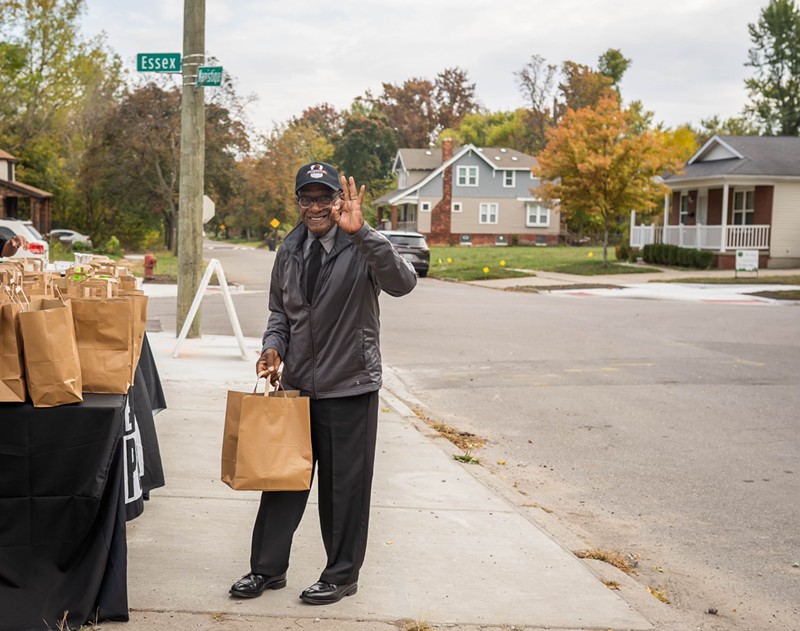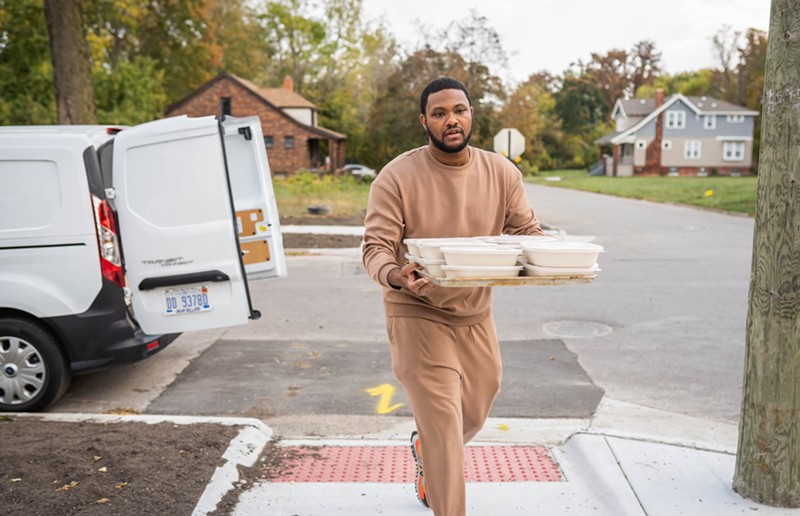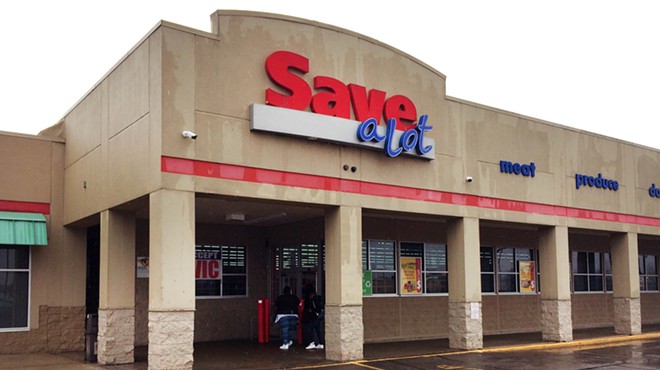We’ve all heard Detroit referred to as a “food desert” at some point. But Raphael Wright says the proper term for the city where liquor stores and fast food are more common than supermarkets is “food swamp.”
“We have grocery stores, but the ones we have are just no good,” he says. “Then you have McDonald’s and Coney Islands and all this stuff surrounding us in pretty much every neighborhood. So we don’t have a deserted issue where nothing can be developed. We just have a swamp issue, because we got all of the wrong stuff.”
His solution to draining the food swamp in Detroit’s Jefferson Chalmers neighborhood, where he grew up, is to open a crowdfunded grocery store called Neighborhood Grocery.
Wright has been raising money to get Neighborhood Grocery up and running in a former liquor store since 2017. It would be the city’s first Black-owned grocery store since 2014.
Construction on Neighborhood Grocery is mostly complete, and Wright is waiting for the final approvals from the city to open. In the meantime, he’s launched a grocery box distribution program to give out free boxes of food to whoever needs it.
Wright first began distributing the boxes periodically during the summer and started offering them every weekend in December.
“This is our way of acknowledging the neighborhood while addressing the issue that’s happening in the country, city, and state,” he says. “Food insecurity has skyrocketed and inflation and poverty have kind of stepped up to the plate to knock us down a little bit. So this effort is to address that and give us something to do while we’re still wrapping things up with the store.”
The boxes include fresh produce, pantry staples, recipe cards, and information on how to receive public assistance for things like food, heating, and housing.
Where possible, Wright tries to include products from local Black-owned companies and is working with organizations like the American Heart Association, Farmacy Foods, and Wayne State Health to promote healthier eating habits. Wright is also a co-founder of Taste the Diaspora Detroit, which has distributed free plant-based meals to Jefferson Chalmers families in the past.
“These past few weeks, it has been all Black-owned businesses,” he says. “We’ve aligned with the American Heart Association in presenting heart-healthy food because of the high levels of hypertension and obesity in the area. So we included things like seasoning from MFER Seasonings that are salt-free, for example.”
There are no requirements to receive a grocery box and they’re distributed every Sunday on a first-come, first-serve basis. While it’s open to anyone, Wright emphasizes he wants to prioritize families living in Jefferson Chalmers.
“As a neighborhood collective, we are focusing on people in this area first,” he says. “Our marketing hasn’t been that heavy for that reason, and we focus on sending email blasts to our neighboring organizations around the store to make sure they spread the word. But we aren’t turning anybody away. Nobody has ‘I’m not from the neighborhood’ stamped on their forehead, and it’s like not if you’re white you can’t come or anything like that. We don’t know anybody’s circumstances.”
In true Neighborhood Grocery fashion, the boxes are also crowdfunded. Wright relies on donations to sponsor the grocery boxes, which cost $74.99 each. Sometimes he gets a lot of donations and sometimes he doesn’t, but no matter what he always comes through.
“The first week that we did it, I sold 20 boxes, which is pretty good with no promotion really,” he says. “The second week I only sold four and I was going to postpone distribution but I got some inquiries on Instagram from families that just really needed them, so I filled the orders and personally delivered them.”

Wright tells us he’s had five boxes sponsored this week so far and is hoping to get more donations by Friday’s cut-off.
Right now he’s just testing the waters for his full grocery box program he wants to run once the store opens. At that point, they will be available for purchase.
“This is just a piloted concept but I want to roll out a fully curated grocery box that contains pretty much every section in the grocery store for customers’ convenience given that people are busy and work,” he says. “Once the store is open and I’m actually selling grocery boxes to residents, I don’t want to get rid of this program but we will have to do some type of adjustments so that I’m not just passing out one box to the same family every week. I don’t want to pacify the neighborhood or want people to think I’m just giving away free stuff. I want people to really come to me when they need help, not just because I’m there and they don’t want to spend their money.”
Neighborhood Grocery is 100% crowdfunded, except Wright’s initial investment, which he says “broke [his] pockets to hell” but he's determined to find a solution to food insecurity in his neighborhood.
“I wanted to start redeveloping these neighborhoods that I’m from and that look like where I’m from and as a victim of food insecurity who was diagnosed with diabetes when I was 19, I came to the conclusion that it starts with food,” he says. “I used crowdfunding literally because I don’t have the money. I wasn’t born into a wealthy family or have wealthy relatives to lean on for investments or loans. I don’t have the credit score or check off the boxes to receive a loan in a traditional sense, so crowdfunding became the way that I could give this a chance to be manifested.”
So far, $280,000 has gone toward opening Neighborhood Grocery, including 1,100 donations, $20,000 of Wright’s own money, and funds from more than 400 community investors.
While the grocery store is one way of increasing access to healthy food for Detroiters, Wright says he’s also working to change his community’s mindset.
“There’s other layers that are attached to it like lack of education, lack of awareness, and lack of care, which is something that we as the Black community tend to try and run away from,” he says. “I’m in the streets every day and a lot of us just don’t care to eat healthier. We live in a community of people that promote death all the time. It's like, shit, I don’t care about eating a salad when I don’t even know if I’m gonna be alive tomorrow, or the latest rap song says I’m gonna be dead and somebody's gonna rob and kill me or whatever. So we have to change the culture too and projects like this look to address all of those types of issues.”
Wright partners with various businesses in Jefferson Chalmers that serve as distribution locations, like the Manistique Community Treehouse Center and Coriander Kitchen and Farm.
Distribution locations for each week are typically announced through the Neighborhood Grocery Instagram page. More information is available at neighborhood-grocery.com.
Coming soon: Metro Times Daily newsletter. We’ll send you a handful of interesting Detroit stories every morning. Subscribe now to not miss a thing.
Follow us: Google News | NewsBreak | Reddit | Instagram | Facebook | Twitter








